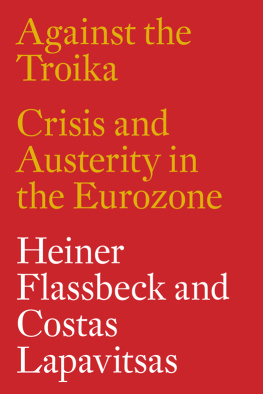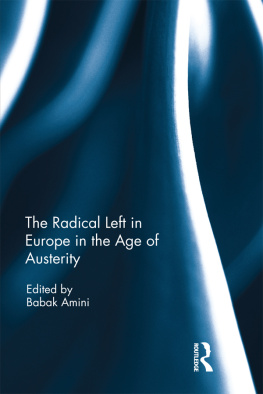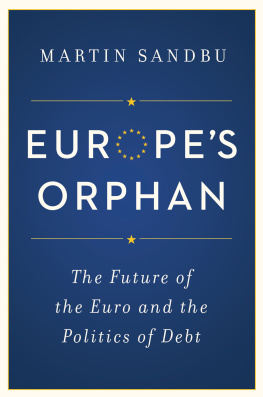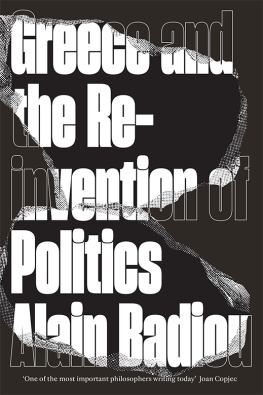Oskar Lafontaine,
Former president of the Social Democratic Party
and the Die Linke Party in Germany
At the beginning of 2015 Europe finds itself at a critical stage of its development. With the overall economy still in recession, unemployment sky high and a political leadership unable to cope with the complex questions raised by the long-lasting crisis of the European Monetary Union, the idea of a peacefully united European continent is fading away.
For someone like me, who grew up in a small town very close to the French border and was raised in a strong pan-European spirit, the vision of a united Europe, to be reached through the gradual convergence of living standards, the deepening of democracy, and the flowering of a truly European culture, has been a political beacon for many decades.
Today, in face of a neverending crisis of the European institutions and with hardship imposed on millions of guiltless people across Europe, it is deeply worrisome to observe the rise of the ideas of the far right, ideas that we used to consider irreversibly bankrupt. Nationalism, directed explicitly against the idea of a united Europe, is gaining ground in countries of the North as well as of the South.
The reasons for this sad development are described masterfully in this new book by economists Heiner Flassbeck and Costas Lapavitsas, both with extensive international experience in research and policy, while one hails from the North and the other from the South of Europe. They demonstrate with clarity that the mercantilist and deflationary policies pursued by Germany since the beginning of EMU must carry the blame for the great rupture that is currently threatening Europe. Even more disturbing, in the aftermath of the global crisis of 20079, a creditor country such as Germany has gained enormous power, but made bad use of it. Austerity and wage cuts, imposed by the creditors on the debtors, have caused a great depression in Greece, while obliterating the notion of a common European project. It would be simply intolerable for democratically elected governments in Paris, Rome or Athens for the direction of their economic policies to be dictated by Berlin.
In light of the unwillingness of Germany to change course and considering the nationalist dangers that attitude is likely to provoke in still more countries of Europe, the warnings of Flassbeck and Lapavitsas should not be ignored. Sometimes it is necessary to take a step back, if progress is to be made. The European Monetary Union, designed to crown European integration, should not become its tombstone. If countries cannot comply with the austerity and other adjustment conditions without endangering democracy and social cohesion, they should be given a way out of the straightjacket of the Monetary Union and be allowed to take their fate in their own hands. If the European Union is unable to assist countries in a truly collegial and associational way, it should proceed to dismantle the unviable Monetary Union, thus creating a fresh basis for a more credible process of integration.
Paul Mason,
Author and economics editor of Channel 4 News in the UK
The OECD wont spell it out themselves, but fifty-year projections by their economists in 2014 carried a dire implication: for the developed world, the best of capitalism is over. Long-term growth rates are likely to be suppressed by low productivity, high ratios of elderly people to young workers and an overhanding debt problem that, in turn, demands greater wage austerity and inroads into the welfare state.
For the immediate future the crisis has created an oversupply of workers and capital, and an undersupply of profits, wages, inflation and growth. And this changes the macroeconomic game. National economic strategy has, for the whole neoliberal era, been premised on the assumption that the global game was winwin and the best way to play it was through collaboration.
But, in the seventh year of post-Lehman austerity, that is no longer true. Recession has turned into a long stagnation for the developed world; and with each of the BRIC countries now facing a structural crisis, it is time for policy makers to take a long stare at that fifty-year horizon and rethink.
If growth is dwindling, the imperative for any country becomes, first, to secure a fair share of it and, second, if possible more than that.
And that, effectively is what three out of four major players in the world economy have begun to do: America, through its fiscal deficit, bank bailouts and quantitative easing policy, has cornered most of the growth available to the West; and Japan and China are now locked in an undeclared currency war, each using loose monetary policy to maintain growth.
Only Europe refuses to compete. Its national elites, and the supranational elite around the EU institutions, can only repeat the broken mantras that have led the continent towards stagnation.
The European Central Bank (ECB) has consistently acted late, and conservatively, in the use of monetary policy to mitigate the stagnation crisis. Only in 2012, faced with an existential bond crisis, did it begin to use policy tools unconventionally. Even now, as this book goes to press, it is not clear whether it can bring itself to deliver full quantitative easing.
With fiscal policy, the entire continent is locked in at Germanys behest to a damaging and needless austerity: policy-created output gaps at 2 or 3 per cent of GDP even for the healthiest economies will look to our grandchildren like madness. We are facing a century of stagnation so we impose stagnation some more to meet rules designed in a previous era.
The barometer of policy dysfunction is now clear: political discontent. The party political systems in Japan, China and even for all the shouting America remain intact. But in many European countries there is now a right-wing conservative nationalist opposition with double-digit support: UKIP, the Front National, the Sweden Democrats. In Spain and Greece, almost out of nowhere, there are radical left parties with a serious chance of winning elections.
In the face of mass unemployment and now the political threat from outsider parties, the complacency of the European elite is striking. They were always the embarrassed underachievers within neoliberalism: the EU was the only free market project in the world saddled with a high-cost welfare state and an overt social contract with its workforce. They believed in neoliberalism more than they were allowed to practise it.










